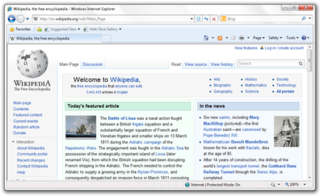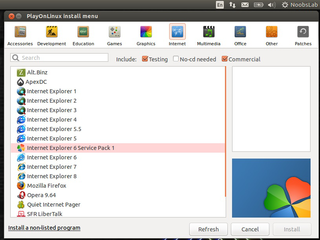
Internet Explorer is a deprecated series of graphical web browsers developed by Microsoft that were used in the Windows line of operating systems. While IE has been discontinued on most Windows editions, it remains supported on certain editions of Windows, such as Windows 10 LTSB/LTSC. Starting in 1995, it was first released as part of the add-on package Plus! for Windows 95 that year. Later versions were available as free downloads or in-service packs and included in the original equipment manufacturer (OEM) service releases of Windows 95 and later versions of Windows. Microsoft spent over US$100 million per year on Internet Explorer in the late 1990s, with over 1,000 people involved in the project by 1999. New feature development for the browser was discontinued in 2016 and ended support on June 15, 2022, in favor of its successor, Microsoft Edge.

Wine is a free and open-source compatibility layer that aims to allow application software and computer games developed for Microsoft Windows to run on Unix-like operating systems. Wine also provides a software library, named Winelib, against which developers can compile Windows applications to help port them to Unix-like systems.
This is a comparison of both historical and current web browsers based on developer, engine, platform(s), releases, license, and cost.

Ubuntu is a Linux distribution based on Debian and composed mostly of free and open-source software. Ubuntu is officially released in multiple editions: Desktop, Server, and Core for Internet of things devices and robots. All of the editions can run on a computer alone, or in a virtual machine. Ubuntu is a popular operating system for cloud computing, with support for OpenStack. Ubuntu's default desktop changed back from the in-house Unity to GNOME after nearly 6.5 years in 2017 upon the release of version 17.10.

Windows Internet Explorer 7 (IE7) is a web browser for Windows. It has been retired on all Windows versions except Windows Embedded Compact 2013. It was released by Microsoft on October 18, 2006, as the seventh version of Internet Explorer and the successor to Internet Explorer 6. Internet Explorer 7 is part of a long line of versions of Internet Explorer and was the first major update to the browser since 2001. It was the default browser in Windows Vista and Windows Server 2008, as well as Windows Embedded POSReady 2009, and can replace Internet Explorer 6 on Windows XP and Windows Server 2003, but unlike version 6, this version does not support Windows 2000, Windows ME, or earlier versions of Windows. It also does not support Windows 7, Windows Server 2008 R2 or later Windows Versions.

Microsoft Internet Explorer 6 (IE6) is a graphical web browser developed by Microsoft for Windows operating systems. Released on August 24, 2001, it is the sixth, and by now discontinued, version of Internet Explorer and the successor to Internet Explorer 5. It was the default browser in Windows XP and Windows Server 2003 and can replace previous versions of Internet Explorer on Windows NT 4.0, Windows 98, Windows 2000 and Windows ME but unlike version 5, this version does not support Windows 95 or earlier versions. IE6 SP2+ and IE7 were only included in or available (IE7) for Windows XP SP2+.

Software remastering is software development that recreates system software and applications while incorporating customizations, with the intent that it is copied and run elsewhere for "off-label" usage. The term comes from remastering in media production, where it is similarly distinguished from mere copying.

Windows Internet Explorer 8 (IE8) is the eighth and, by now, discontinued version of the Internet Explorer web browser for Windows. It was released by Microsoft on March 19, 2009, as the successor to Internet Explorer 7. It was the default browser in Windows 7 and Windows Server 2008 R2.

Internet Explorer 9 or IE9 is the ninth version of the Internet Explorer web browser for Windows. It was released by Microsoft on March 14, 2011, as the ninth version of Internet Explorer and the successor to Internet Explorer 8. Microsoft released Internet Explorer 9 as a major out-of-band version that was not tied to the release schedule of any particular version of Windows, unlike previous versions. It is the first version of Internet Explorer not to be bundled with a Windows operating system, although some OEMs have installed it with Windows 7 on their PCs. Internet Explorer 9 is the last version that is called Windows Internet Explorer. The software was rebranded simply as Internet Explorer starting in 2012 with the release of Internet Explorer 10.

PlayOnLinux is a graphical frontend for the Wine software compatibility layer which allows Linux users to install Windows-based video games, Microsoft Office, Microsoft Internet Explorer, as well as many other applications such as Apple iTunes and Safari.

Google Chrome is a cross-platform web browser developed by Google. It was first released in 2008 for Microsoft Windows, built with free software components from Apple WebKit and Mozilla Firefox. Versions were later released for Linux, macOS, iOS, and also for Android, where it is the default browser. The browser is also the main component of ChromeOS, where it serves as the platform for web applications.

Ubiquity is the default installer for Ubuntu and its derivatives. It is run from the Live CD or USB and can be triggered to run from the options on the device or on the desktop of the Live mode. It was first introduced in Ubuntu 6.06 LTS "Dapper Drake". At program start, it allows the user to change the language to a local language if they prefer. It is designed to be easy to use.
Internet Explorer is a series of graphical web browsers developed by Microsoft and included as part of the Microsoft Windows line of operating systems, starting in 1995.

Joli OS was an Ubuntu-based Linux distribution created by Tariq Krim and Romain Huet co-founders of the French company Jolicloud. Joli OS is now an open source project, with source code hosted on GitHub.

Unity is a graphical shell for the GNOME desktop environment originally developed by Canonical Ltd. for its Ubuntu operating system. It debuted in 2010 in the netbook edition of Ubuntu 10.10. Since 2017, its development was taken over by the Unity7 Maintainers (Unity7) and UBports.

Listaller is a free computer software installation system aimed at making it simple to create a package that can be installed on all Linux distributions as well as providing tools and API to make software management on Linux more user-friendly.

Internet Explorer 10 (IE10) is the tenth, and by now, discontinued, version of the Internet Explorer web browser and the successor to Internet Explorer 9, released by Microsoft on September 4, 2012, shortly after the completion of Windows Server 2012. It was the default browser that shipped with Windows 8 and Windows Server 2012 and can replace previous versions of Internet Explorer on Windows 7 and Windows Server 2008 R2 but unlike version 9, this version doesn't support Windows Vista, Windows Server 2008 or earlier.

elementary OS is a Linux distribution based on Ubuntu LTS. It promotes itself as a "thoughtful, capable, and ethical" replacement to macOS and Windows and has a pay-what-you-want model. The operating system, the desktop environment, and accompanying applications are developed and maintained by Elementary, Inc.

Snap is a software packaging and deployment system developed by Canonical for operating systems that use the Linux kernel and the systemd init system. The packages, called snaps, and the tool for using them, snapd, work across a range of Linux distributions and allow upstream software developers to distribute their applications directly to users. Snaps are self-contained applications running in a sandbox with mediated access to the host system. Snap was originally released for cloud applications but was later ported to also work for Internet of Things devices and desktop applications.

Windows Subsystem for Linux (WSL) is a feature of Windows that allows developers to run a Linux environment without the need for a separate virtual machine or dual booting. There are two versions of WSL: WSL 1 and WSL 2. WSL 1 was first released on August 2, 2016, and acts as a compatibility layer for running Linux binary executables by implementing Linux system calls on the Windows kernel. It is available on Windows 10, Windows 10 LTSB/LTSC, Windows 11, Windows Server 2016, Windows Server 2019 and Windows Server 2022.


















